HiFi has always been a hot topic, and many mobile phones released recently are also focusing on HiFi sound quality: those using ES9318 DAC+ two-in-one audio chip, those using AKM HiFi chip and equipped with HUAWEI histen sound effects, and those supporting Bluetooth aptX & aptX HD HD music transmission, etc., all prove that mobile phone audio has always existed in an important position in the industry. So what is HiFi? What are the technical indicators of HiFi? What are the types of common mobile phone HiFi chips and what are their performances? You will know after reading this article.
 Mobile phone HiFi, hi, no, hi. After reading these, you can be considered into the pit.
Mobile phone HiFi, hi, no, hi. After reading these, you can be considered into the pit.
The full name of HiFi is High Fidelity, which literally translates as "high fidelity". To put it bluntly, it is a playback sound that is highly similar to the original sound. Spreading digital music on the network often needs to be suppressed, and there will be lossy and lossless compression. What we often see is that MP3 is a kind of lossy compression, which will affect the sound quality. Playing music is to convert digital signals into analog signals, and then amplify the analog signals and transmit them to headphones or speakers. HiFi is to make the final music close to the sound that the producer wants you to hear after production, that is, the sound quality is good.
Of course, sound quality and sense of hearing are not the same concept. The reason why audio is a metaphysics is that the sense of hearing varies from person to person, so there are "golden ears" and "fungus", and headphones or stereos of audio terminals will have different output performances because of various differences. At the same time, things like dolby pro logic and SRS sound effects all create distortion to improve the sense of hearing. The mobile phone HiFi we are talking about here is more about what kind of audio output the mobile phone as the output front end can have.
What are the common technical indicators of HiFi?
For audio veterans, mobile phones as the front end are often dismissive, because there is an irreparable hardware gap between mobile phone HiFi and professional audio, which the author will mention later. But for ordinary consumers, a carefully designed mobile phone with audio system is enough as a toy for getting started with audio.
I believe that there are not a few users who listen to songs on their mobile phones, but not many people know about HiFi. Moreover, when they go to see professional audio evaluation, there are many technical indicators that they can’t understand, but those who know audio are unwilling to explain more. The common technical indicators of sound system are: frequency response, signal-to-noise ratio, dynamic range, distortion, transient, stereo separation, stereo balance, audio sampling and so on. Here the author explains it separately.
frequency response: The frequency range of audio equipment during playback and the relationship between signal amplitude and frequency (amplitude-frequency characteristics). The unit of amplitude is dB, and the unit of frequency is Hz. The frequency response of the sound system should reach at least 32-18000Hz, and the signal amplitude change should be less than 2dB within this frequency range.
SNR: Logarithm of the ratio of useful signal to noise at the same reference point. At the input point of the speaker, the signal-to-noise ratio is 70dB, and the noise of one meter away from the speaker is almost inaudible, and the HiFi system generally reaches above 110dB.
dynamic range: Logarithm of the ratio of the maximum undistorted output power of audio equipment to the static system noise output power. HiFi system generally reaches more than 100dB.
degree of distortion: The degree of distortion of sound source signal when audio equipment plays back. The distortion of audio power amplifier can be divided into two categories: electrical distortion and acoustic distortion. The electrical distortion is caused by the circuit, and the acoustic distortion is caused by the speaker of the sound reproduction device. The types of electrical distortion are harmonic distortion, intermodulation distortion and transient distortion. Acoustic distortion is mainly AC interface distortion. The harmonic distortion of HiFi system is generally less than 1%.
stereo isolation: the separation degree of the left and right channels. Reflect the crosstalk degree of the left and right channels.
Stereo balance: The difference between the signal gains of the left and right channels.
transient stateRefers to those short and explosive sounds in music (especially percussion), which are usually difficult to reproduce accurately. Represents a physical quantity or phenomenon that changes between two adjacent stable States, and its change time is less than the time scale of concern.
Audio samplingDigital audio system reproduces the original sound by converting the sound wave into a series of binary data. The equipment used to realize this step is analog/digital (A/D), which samples the sound wave at the rate of tens of thousands of times per second, and each sampling records the state of the original analog sound wave at a certain moment, which is called a sample. A string of samples can be connected to describe a sound wave, and the number of samples per second is called sampling frequency or yield, and the unit is HZ (hertz). The higher the sampling frequency, the higher the acoustic frequency can be described.
 Some audio chip parameters (picture quoted from love machine)
Some audio chip parameters (picture quoted from love machine)
Signal-to-noise ratio, stereo separation and stereo balance can be distinguished by human ears, and other indicators need to be compared by multi-system comparison. Knowing this, it is not so difficult to understand when we look at the technical parameters of those mobile phone audio chips.
What are the common evaluation elements of HiFi we are talking about?
When watching audio evaluation, it is often confusing for beginners, because they don’t know what those evaluation elements mean. Although it is only a piece of music, there are many doorways. So here, the author selects three common evaluation factors to explain: sound resolution, frequency band and sound stage.
Sound resolving power
Analytic power intuitively means the clarity of sound and the expressive ability of detailed information. For example, this is like the resolution of a display screen. The higher the resolution, the clearer the picture, and the same is true for audio equipment. However, there is no clear quantitative index to measure it, so we can only rely on the human ear for subjective evaluation.
 The higher the resolution, the more details we can "see" (picture from bilibili)
The higher the resolution, the more details we can "see" (picture from bilibili)
The analytical power of equipment has a comprehensive influence on human ears, including the cleanliness of the sound floor, the performance of overtones, the saturation of timbre, the clarity of sound image form, the texture of sound, etc. Simply put, it is "the ability to analyze musical details without losing information". HiFi is mostly exposed to the analytical power of earphone units. The resolving power of earphone unit is mainly related to the material, thickness and coil technology of diaphragm, which requires high technology and is a large part of the investment in R&D by manufacturers, thus directly determining the R&D and production cost of the unit.
In addition to the clarity of sound and the amount of detailed information, the benefits brought by high resolution are obvious separation of human voices and musical instruments. The so-called degree of separation is the layering of music. The better the layering, the easier it is for us to distinguish between human voices and background music, and the voices with low degree of separation will be mixed with instrumental sounds.
Of course, the degree of separation can be adjusted to a certain extent, such as reducing low frequencies and highlighting middle and high frequencies, so that the details will be clear, but the problem is that the amount of information in low frequencies is reduced, and then the music will appear thin.
But too high resolution will also bring problems, that is, distortion. Generally, earphones with higher price will have higher resolution, but the resolution will be seriously distorted simply by improving the sensitivity of the unit diaphragm to current, so the resolution of low-resistance earphones will not be set too high, because the front-end (power amplifier circuit) has limited control power, and strong resolution will bring greater dynamic distortion, which is why high-end earphones are mostly high impedance.
 Sennheiser HD650 with 300 ohm impedance
Sennheiser HD650 with 300 ohm impedance
However, the portable mobile phone HiFi has the problem of insufficient thrust. The larger the impedance, the smaller the sensitivity, and the harder it is to push the earphone. Therefore, it is not a wise choice to buy high-impedance high-end headphones only by looking at the price. The most serious consequence of insufficient thrust is that the music is poor in dynamics, and all the detailed sounds heard at the same time will be displayed in one plane, with no ups and downs in sound, no contrast in vocal instruments, lack of emotion, and the image is just like boiled water, which is seriously distorted. In a high resolution system, besides the unit quality, the control ability of the front-end system is particularly important.
frequency band
The so-called capacity distribution of high, medium and low frequency bands refers to the quantity of each frequency band within the frequency range that the equipment can emit. Some equipment has more high-frequency bands, some have a strong sense of low frequency, and some middle-frequency bands are particularly full of voices, but the amount of high and low segments is not so much.
The requirements of high frequency for each kind of listening and everyone’s listening habits are different. For music, it is not sharp to go up to the frequency band reached by music itself, that is to say, it can be said to be excellent if it is not stuffy and lubricated; It is very difficult to connect the intermediate frequency with the high frequency and low frequency. Almost all earphones can’t perfectly interpret the thick bass and thin soprano, and at the same time perfectly interpret the characteristics of each musical instrument. Low frequency is the most difficult frequency band to do, and it is not easy to do well in dive, elasticity and overtone during playback, so high-end headphones and earplugs are all working hard in this respect.
There is no absolute difference between the quantity sense of each frequency band and the quality sense. What is important is to achieve a balance after the overall collocation. The control of each frequency band tests the ability of audio equipment, such as whether the low frequency is loose or tight, whether the high frequency is lubricated or sharp, and so on.
Sound stage
Sound stage is the range in which the sound emitted by two speakers can be condensed and formed. Usually, if the two speakers are properly positioned (including the distance from the back wall and side wall, the height of the speakers and the angle of tilting inward, etc.), a concrete sound stage will emerge. You can even "see" the positions and distances of various vocal instruments and voices behind the speakers. To put it bluntly, it is an immersive listening experience.
 Sound stage’s feelings have a lot to do with the sound layout (picture quoted from Baidu Encyclopedia)
Sound stage’s feelings have a lot to do with the sound layout (picture quoted from Baidu Encyclopedia)
Theoretically speaking, the reason why human ears can feel the sound field is because of the loudness difference and time difference between the left and right ears. The louder the sound channel is, the closer it is to the human ear. The loudness difference between the left and right ears enables the human ear to identify the sound source. At the same time, the delay of sound (residual sound) further enhances the three-dimensional sense of sound.
But it is not easy to form a good sound stage. Because the human ear is sensitive to different frequencies, not all frequencies can distinguish the distance and orientation, and about 7kHz is the most sensitive, while the extremely high frequency and extremely low frequency sounds have no directivity or very weak directivity. Relatively speaking, low-frequency directivity is worse, and low-frequency delay is a key quality for field experience.
In addition to the field sense of sound range (width and depth), the image cohesion is also a major index to evaluate sound stage. The shape, three-dimensional degree and sense of distance of the sound are the concrete manifestations of the cohesive force. The image is to see the performance site through the sense of hearing. Different musical instruments or vocals have different positions, sizes and characteristics. What is included in the fundus is a collection of all musical instruments and vocals, but they exist alone. You can see the individual characteristics of each of them or musical instruments.
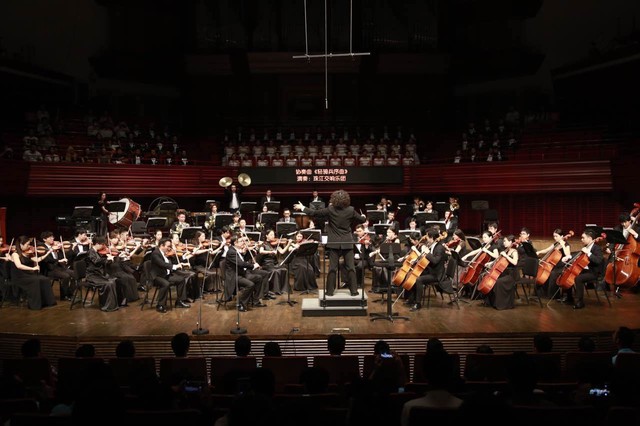 Sound stage’s excellent knot is like being at a concert (picture quoted from Southern Metropolis Daily)
Sound stage’s excellent knot is like being at a concert (picture quoted from Southern Metropolis Daily)
The requirement of image-forming power on audio system is relatively high, which is not only related to the hardware quality and sound quality adjustment of the front end, but also the image-forming power displayed by different headphones is very different. High-performance equipment combined with optimized adjustment can show excellent presence, but for HiFi, which is only an additional function, it is a very severe test, whether from hardware support or adjustment.
Of course, in addition to these three common evaluation indicators, there are many directions for evaluating audio, such as the proportion of musical instruments and the overall balance, but after understanding the above three evaluation factors, we can understand most of the audio evaluation.
What are the code names of HiFi? What are the reasons that restrict mobile phone HiFi?
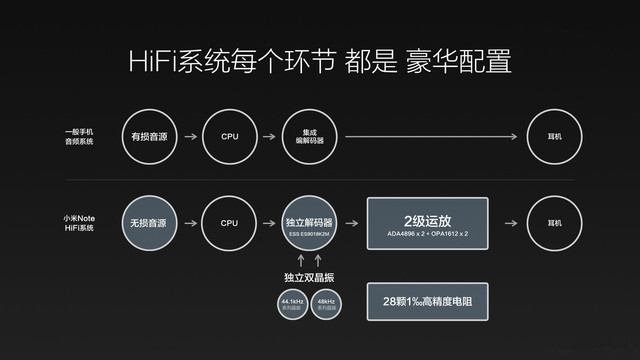 HiFi system of Xiaomi Note
HiFi system of Xiaomi Note
When we look at manufacturers’ promotion of HiFi selling points, there are always words such as DAC, ADC and operational amplifier. But for audio white, it is often confused. Here’s a brief introduction to common terms and expressions: ADC, SRC, DAC, and operational amplifier.
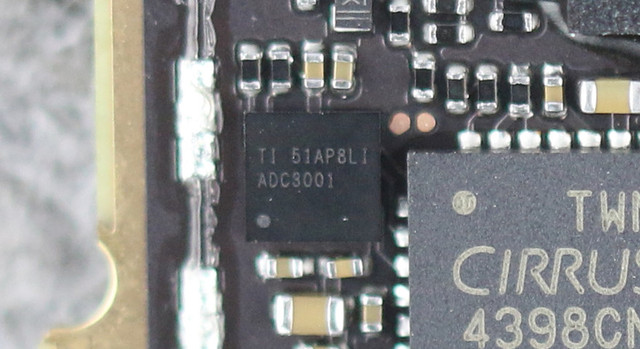 Texas Instruments 51AP8LI ADC3001 audio conversion chip (picture quoted from love machine)
Texas Instruments 51AP8LI ADC3001 audio conversion chip (picture quoted from love machine)
ADC stands for analog-to-digital signal coding chip.This device is rare in the promotion of mobile phone HiFi, and it is mainly used for audio input.
 Independent double clock crystal oscillator
Independent double clock crystal oscillator
The sampling rate of CD is 16bit, 44.1K, and there are other sampling rates such as 48k, 96K and 192K. However, in the later processing, only one type can be processed, so a conversion is needed, and this conversion process is called SRC.This process can easily deteriorate the sound quality. Need special attention, this is a key point for smart phones to do HIFI. Such transcoding chips (such as CS8422) are expensive. At this time, an independent dual-clock crystal oscillator appears, which perfectly solves this problem: one corresponds to 44.1K, the other corresponds to 48K and its integer multiples, and what crystal oscillator is used for music in any format, which solves the SRC problem at low cost.
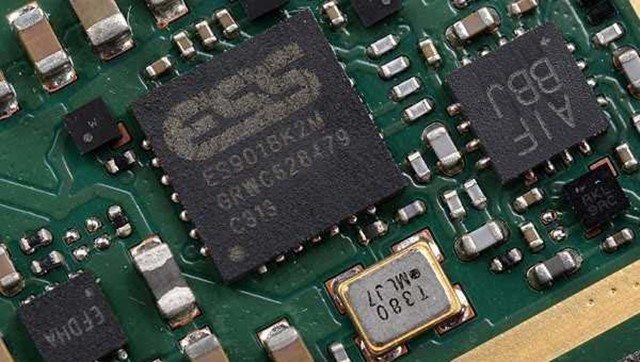 ES9018K2M DAC
ES9018K2M DAC
DAC is a relatively common component, representing a digital-to-analog signal decoding chip, and is a device for converting digital format audio files stored in mobile phones into analog signals.This is the independent audio chip that most mobile phone manufacturers promote, such as ES9018 K2M of Meizu PRO6 Plus. The quality of DAC often represents some quality parameters of the front end, such as dynamic range, signal-to-noise ratio, distortion and so on.
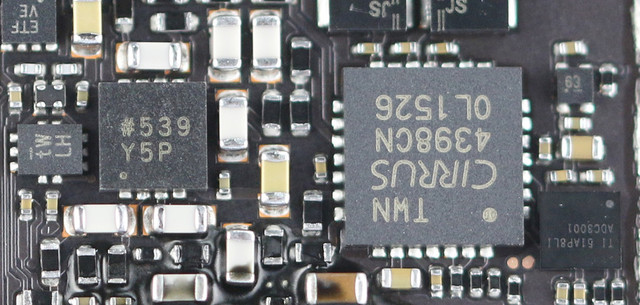 "539Y5P" is the AD45257 operational amplifier chip.
"539Y5P" is the AD45257 operational amplifier chip.
DAC completes analog signal conversion, but the output analog signal is very weak, and then the operational amplifier starts to operate.The full name of operational amplifier is operational amplifier. In the field of multimedia speakers, the operational amplifier chip is mainly responsible for the adjustment of volume, tone and peripheral effects., for example, integrated operational amplifiers are used in the front stage of audio and headphone amplifiers (amplifiers). For example, the common OPA1612 and OPA2604 are operational amplifier chips, and multiple operational amplifier chips can be integrated in one amp.
At present, most of the audio chips used in HiFi mobile phones on the market come from AKM and ESS. Here are some typical examples:
 AK4490EN chip
AK4490EN chip
AK4490EN is an ideal audio chip for mobile devices, which supports 32-bit/768 kHz source code output and high-specification 11.2MHz DSD files. Represents action.
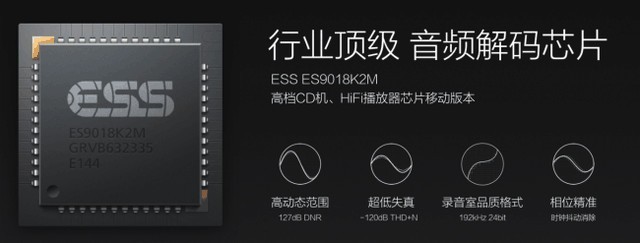
ES9018K2M chip
The ES9018K2M chip has a dynamic range of 127dB, which can fully display the details of music. The ultra-low distortion of -120dB THD+N can better restore the essence of music.
Equipped with ES9038Q2M and three OPA1622 operational amplifiers, it has a dynamic range of 129dB and a distortion of -120dB, and supports DSD hardware decoding.
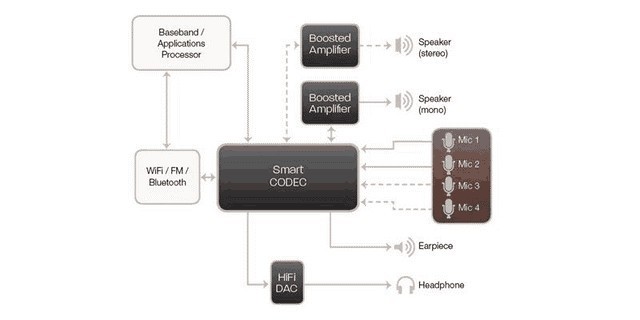 ACS43L36 decoding and ear amplifier integrated chip
ACS43L36 decoding and ear amplifier integrated chip
Of course, in addition to these two chips, CirrusLogic decoding and amp integrated chip CS43L36 has also appeared on Meizu’s PRO 6, and basically all the audio parts involved in PRO 6 are controlled by it.
Although HiFi mobile phone is equipped with professional audio chip, it has a certain gap with high-quality walkman in terms of resolution, dynamic response and thrust. The reason is that the power supply scale, decoding chip specifications and the number of operational amplifiers are not as good as the latter. For example, the ES9018K2M mentioned just now is actually a scaled-down version of ES9018, which is a low-power version specially customized for mobile devices. The former is dual-channel and the latter is 8-channel. Whether it is dynamic range or signal-to-noise ratio, ES9018 is far better than ES9018K2M. The main reason why enthusiasts don’t want to use mobile phones to listen to high-quality headphones is because of the thrust of mobile phones on headphones, and they can’t give full play to good headphones.
In which direction will HiFi develop?
At present, limited by the circuit structure and power supply of mobile phones, there is still a long way to go to equalize the sound quality of professional equipment. Of course, we do not rule out the possibility of improving the battery technology of mobile phones, further optimizing the circuit design, and further controlling the heat and power consumption by high-quality audio chips, but it will be difficult to achieve it for a while.
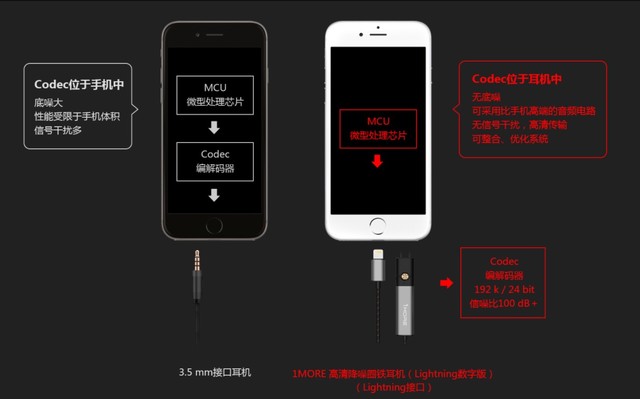 It is also beneficial to integrate the decoding operational amplifier into the earphone.
It is also beneficial to integrate the decoding operational amplifier into the earphone.
In addition, mobile phones are gradually developing towards thinness, and the contradiction between battery capacity and chip power consumption is increasingly prominent, and there are signs of canceling the 3.5mm headphone jack in a large area. The most typical is the series of mobile phones. The 3.5mm earphone interface is cancelled, and the Lightning data interface can only output digital signals, and the decoding and operational amplifier will be integrated into the earphone. Although the high-end audio circuit can be used without signal interference compared with mobile phones to further reduce the noise floor, the power consumption of headphones is serious, and the high-integration decoding and operational amplifier will damage the sound quality output to some extent, and unreasonable circuit design will also produce certain noise floor.
 Active noise reduction principle
Active noise reduction principle
Fortunately, there are still many remedies for mobile phone HiFi. For example, better audio technology is adopted at the earphone end. For example, 1MORE’s Tiinlab A2 exclusive active noise reduction chip can adjust the frequency band for noise reduction with broadband EQ as a supplement, and at the same time, it has a very good adaptability, such as Lightning and USB Type C digital interface. Thanks to the self-planned Tiinlab A2 exclusive active noise reduction chip, 1MORE full-time noise reduction technology achieves a perfect balance between noise reduction effect and sound quality. Tiinlab A2 is in the range of 50-2000Hz, which has covered most business and life frequency bands, which is wider than the frequency band where most noise-reducing headphones are only concentrated within 1000Hz, but at the same time, the noise reduction depth is controlled, and the inhalation feeling will not be too strong.
 Intelligent sonar earphone
Intelligent sonar earphone
Another interesting thing is HTC’s HTC USonic smart sonar headset. This earphone uses sonar to sense the cochlear structure, feeds back the signal to the mobile phone, makes custom adjustment according to the specific shape of each ear, and then outputs lossless timbre through USB-C interface, providing a good audio experience.
 MDR-XB950BT Bluetooth Headset
MDR-XB950BT Bluetooth Headset
At the beginning of this article, we mentioned that one plus five supports aptX & aptX HD HD music transmission. Undoubtedly, wireless Bluetooth will also be one of the solutions for future mobile phone HiFi. At present, the main quality standards of Bluetooth audio coding are SBC, AAC, aptX and LDAC from low to high. SBC has the best compatibility and the worst sound quality. AAC is relatively better. If the mobile phone plays AAC audio files, then using AAC Bluetooth coding transmission can save a coding conversion step, and the sound quality is more fidelity, but the gap is not small. AptX is a higher Bluetooth audio coding, and aptX-HD can achieve near lossless sound quality. LDAC is a Bluetooth audio coding promoted by Sony, which can achieve -Res lossless audio transmission and has the best sound quality. However, apart from Sony’s own equipment, there are not many supporting this coding at present, but it is the future development direction.
Write it at the end
After reading the above contents, I believe everyone has a certain understanding of audio and mobile phone HiFi. Although these are only nine Niu Yi hairs in the audio industry, after understanding these, we can roughly understand what level of mobile phone HiFi is promoted by mobile phone manufacturers, and we can also have some basic knowledge support when choosing headphones. Of course, it should be kept in mind that even when purchasing headphones for HiFi mobile phones, you can’t just look at the price. After all, the thrust of mobile phones is limited, and different headphones have different styles. The right combination of front and rear ends is the best choice.













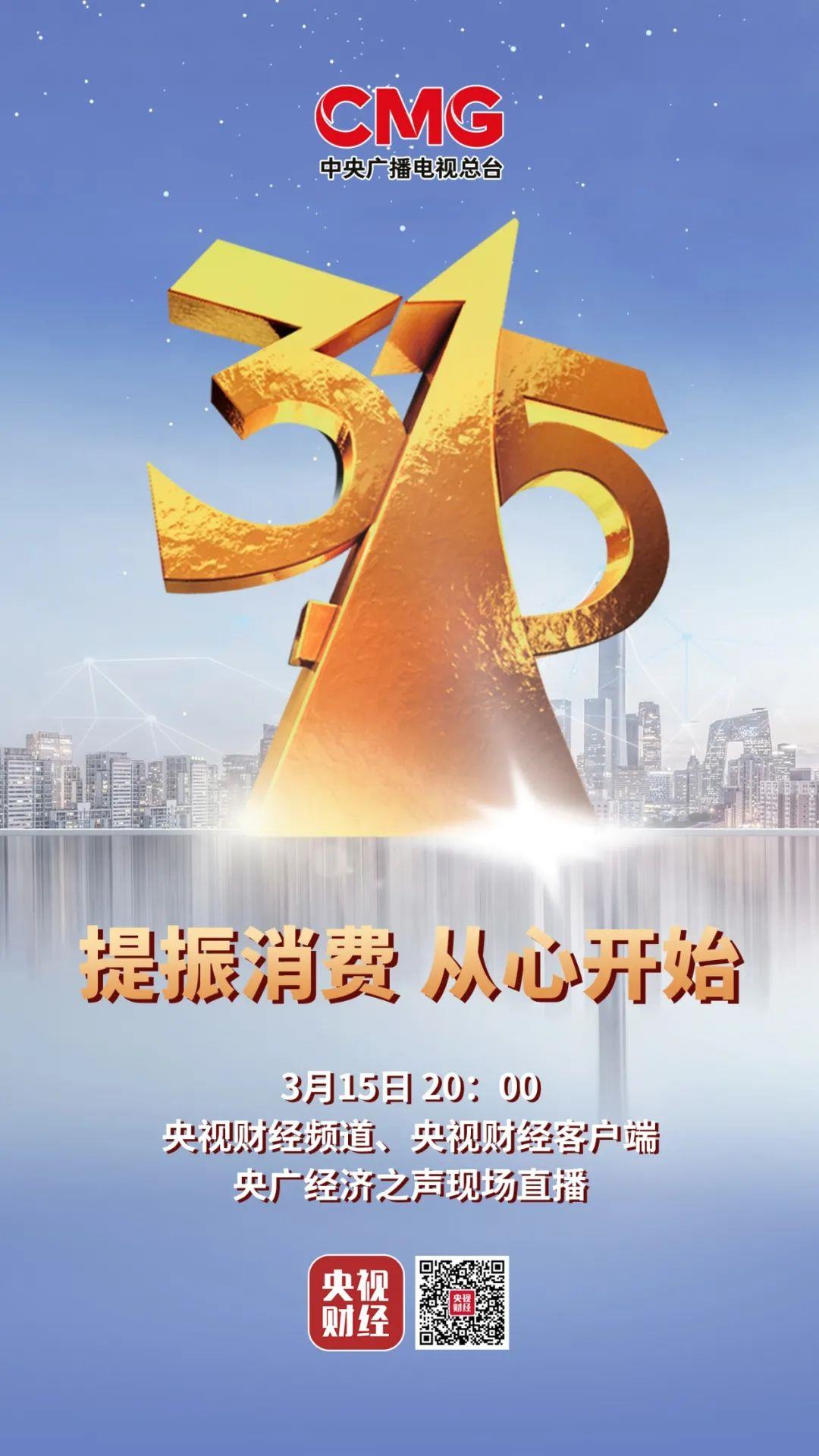
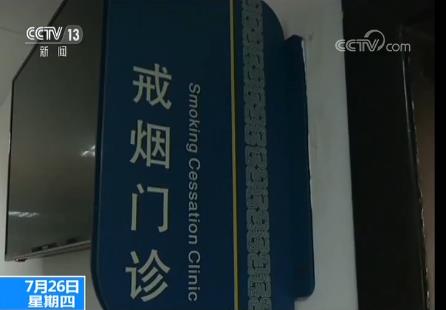
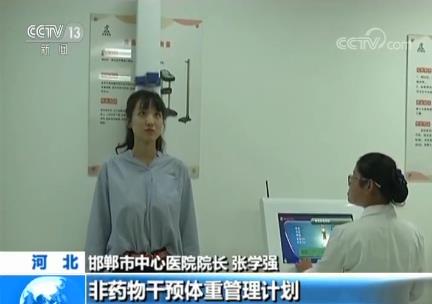
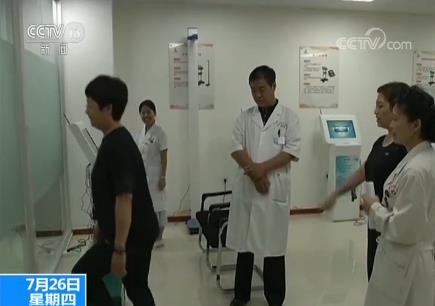
 Mobile phone HiFi, hi, no, hi. After reading these, you can be considered into the pit.
Mobile phone HiFi, hi, no, hi. After reading these, you can be considered into the pit. Some audio chip parameters (picture quoted from love machine)
Some audio chip parameters (picture quoted from love machine) The higher the resolution, the more details we can "see" (picture from bilibili)
The higher the resolution, the more details we can "see" (picture from bilibili) Sennheiser HD650 with 300 ohm impedance
Sennheiser HD650 with 300 ohm impedance Sound stage’s feelings have a lot to do with the sound layout (picture quoted from Baidu Encyclopedia)
Sound stage’s feelings have a lot to do with the sound layout (picture quoted from Baidu Encyclopedia) Sound stage’s excellent knot is like being at a concert (picture quoted from Southern Metropolis Daily)
Sound stage’s excellent knot is like being at a concert (picture quoted from Southern Metropolis Daily) HiFi system of Xiaomi Note
HiFi system of Xiaomi Note Texas Instruments 51AP8LI ADC3001 audio conversion chip (picture quoted from love machine)
Texas Instruments 51AP8LI ADC3001 audio conversion chip (picture quoted from love machine) Independent double clock crystal oscillator
Independent double clock crystal oscillator ES9018K2M DAC
ES9018K2M DAC "539Y5P" is the AD45257 operational amplifier chip.
"539Y5P" is the AD45257 operational amplifier chip. AK4490EN chip
AK4490EN chip
 ACS43L36 decoding and ear amplifier integrated chip
ACS43L36 decoding and ear amplifier integrated chip It is also beneficial to integrate the decoding operational amplifier into the earphone.
It is also beneficial to integrate the decoding operational amplifier into the earphone. Active noise reduction principle
Active noise reduction principle Intelligent sonar earphone
Intelligent sonar earphone MDR-XB950BT Bluetooth Headset
MDR-XB950BT Bluetooth Headset